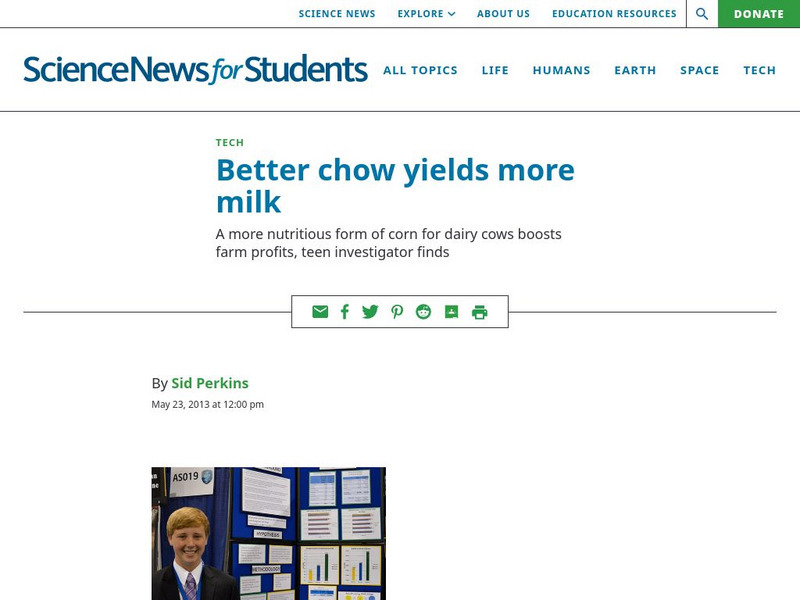Curated OER
Evolution: Adaptation
Tenth graders practice new skills and apply them. The skills of research should motivate them to want more knowledge. The concept of adaptation is used as a context for the lesson of practicing research skills.
Curated OER
Water Pollution
Fifth graders examine what contaminated water looks like, and how it becomes polluted. They examine a teacher demonstration of water is not polluted but does contain rocks and other things that do need to be cleaned out before drinking...
Curated OER
Don't Marry the Mole!
Third graders examine the power of solar energy. In groups, they create their own pizza box solar oven to discover the power of the sun and how it is a source for heat and light. To end the lesson, they use the internet to examine...
Curated OER
Spring Harvest
Students engage in a lesson that is interested in the foods related to the season of Spring. They conduct research using a variety of resources while creating menus to match the regions of The United States. Students create food items...
Texas Instruments
Texas Instruments: Science Today 2004 Corn Crop Is a Bin Buster
With this resource, students will examine and evaluate data on the corn harvest in the United States over the past several years. Using the USA TODAY Snapshot "2004 corn crop is a bin-buster," data from the USDA Statistics Service...
Other
Harvesting: Corn Shellers
The history of corn shellers as well as their modern day usage or harvesting corn is given in this informative site.
Other
Corning Optical Fibers
Corning serves as a leader in optical fiber technology and this website provides information about the uses of optical fibers in medical imaging, communication, etc., as well as industry news and related resources.
Other
Harvesting: Corn Pickers
A brief but informative report on the development of machinery to harvest corn.
TeachEngineering
Teach Engineering: Corn for Fuel?!
In this activity, students examine how to grow plants the most efficiently. They imagine that they are designing a biofuels production facility and need to know how to efficiently grow plants to use in this facility. As a means of...
National Academies of Sciences, Engineering, and Medicine
The National Academies: Emerging Technologies: Biofuels
Biofuels are made from organic materials such as corn and algae, as well as sugars and starches from plant cellulose. They have advantages such as sustainability and lowered greenhouse gas production, but they can impact on the...
Society for Science and the Public
Science News for Students: Better Chow Yields More Milk
This article reports on a recent project from a teen that found that feeding a higher quality corn to dairy cows resulted in increased milk production. Includes a list of vocabulary words.
Other
Successful Farming: Agriculture Online
From Successful Farming magazine, this site presents agriculture news and features for people who are professionals and those studying agriculture. Links to valuable, up-to-date information on topics such as crop news and weather patterns.
Science Buddies
Science Buddies: Are You Gellin'?
Chances are, you have several materials around your house made of gelatinized materials. Gels are used in all kinds of products and materials: pudding, diapers, insoles, packaging, ice cream, toothpaste, and much more. In this project,...
Federal Reserve Bank
Federal Reserve Bank of St. Louis: Tortilla Factory [Pdf]
This lesson accompanies a story by Gary Paulsen called Tortilla Factory, and teaches students to identify the different types of resources (human, capital, natural, etc.) that go into creating corn tortillas and other products.
Other
Adb: How Remote Sensing Technology Improves Efficiency of Irrigation Systems
With the increase of free satellite data combined with scientific algorithms and cloud computing capacity, developing affordable operational monitoring systems for irrigation management in Asia is now feasible. The use of virtual field...
The History Cat
The History Cat: Age of Exploration: The Columbian Exchange
A fascinating look at the exchanges that took place around the world after the Americas were discovered. This covered the gamut from diseases which wiped out 90% of the native peoples in North and South America, to farm animals, tools,...
Curated OER
Etc: Maps Etc: Physical and Cultural Geography of Europe, 1915
Six maps of Europe showing the average rainfall, the major climate zones, agricultural products (rye, corn, wheat, rice, and sugar beets), industrial products (iron, textile, and coal), ethnic groups, and religions.












